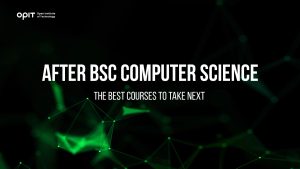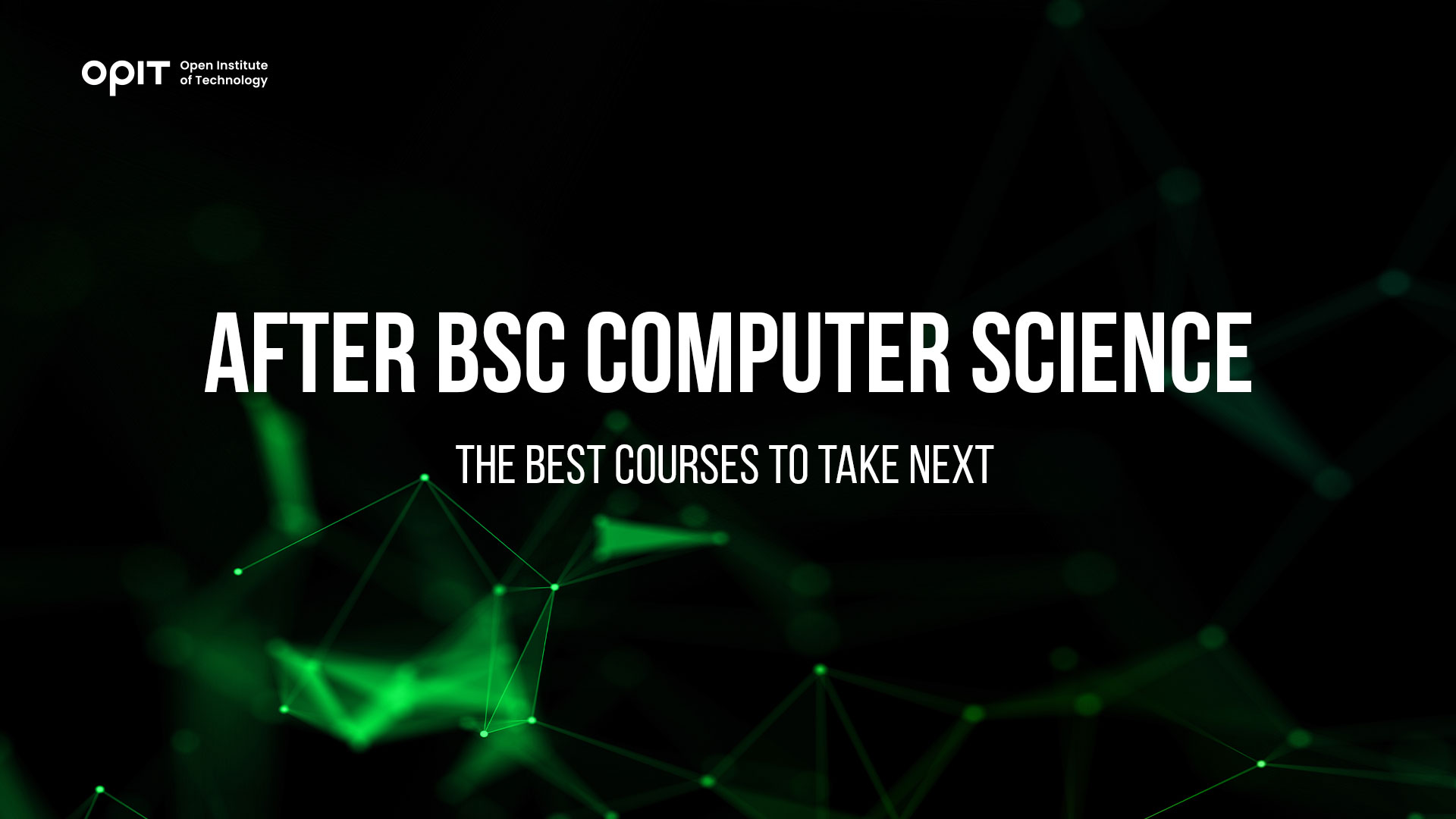

As a BSc Computer Science program graduate, you can further boost your career prospects by applying for additional courses in this field. Doing so will further develop your specialization and increase your chances of landing a job you love and are qualified to perform.
When looking for a course after BSc Computer Science, consider your career goals, budget, learning needs, and curriculum. This article covers the best courses after BSc Computer Science to make the most out of your education in computer science.
MSc Computer Science
A Master of Science degree in Computer Science is the logical next step for students who wish to continue their academic education in the computer science field. Numerous programs are available depending on your preferred specialization, providing plenty of career opportunities.
Some colleges and institutions require you to have a computer science bachelor before you can sign up for a master’s program. It’s best to check the requirements on the institution’s official website.
Some flexible programs like OPIT’s accredited MSc in Applied Data Science and AI don’t require any prerequisites in the field. The program is also self-paced and fully remote and consists of three terms – two terms of courses and the final term for the project or thesis.
A Master of Science in Computer Science may include the following specializations:
- Robotics
- Graphics
- Computing Systems
- Human-Centered Computing
- Artificial Intelligence
- Machine Learning
- Modeling and Simulations
- Social Computing
- Cybersecurity
- Software Engineering
- Data Science
- Information Systems
These specializations may or may not be available at the university or college where you completed your previous education. If you’re determined to get an MSc in Computer Science and have a particular specialization in mind, do extensive research online to find the best program that matches your needs, budget, and skills. An affordable and valuable education upgrade may just be around the corner.
As you can see from above, you’ll find a Master of Science specialization in just about any computer science field. The same goes for career opportunities following an MSc in Computer Science.
Career Opportunities
- Computer Research Analyst
- Computer Network Architect
- Software Developer
- Database Administrator
- Information Security Manager
- Software Development Engineer
- Computer and Information Systems Manager
- Computer Systems Analyst
- Web Developer
- Mobile App Developer
If you’re ever in doubt about pursuing a Master of Science in Computer Science, remember that the average salary for individuals with this degree is $109,000 per year, according to PayScale.
Master of Computer Applications (MCA)
If you’re wondering “what to do after BSc Computer Science,” another popular path is a Master of Computer Applications (MCA). Experts with this degree can create computer applications, test new programs, offer instructions for software users, and more. With a finished MCA, you’re looking at a career that focuses on the practical aspects of software development.
The master’s in this field takes two to three years to complete and is available in colleges worldwide. A math background or at least having had this subject in high school is often the main requirement to enroll in the program. You may also need to undergo a test and an interview.
The MCA programs usually cover computational theory, in-depth algorithm studying and practice, network management, databases, web design, web development, computer networks, and more. The focus of the classes is hands-on software development, so you need to have strong skills in programming languages.
But what are your career opportunities with an MCA?
Career Opportunities
- Computer Systems Analyst
- Computer Programmer
- Software Developer
Although there are fewer career opportunities for MCA takers, the salary of individuals with this degree goes up to $133,000 annually, making an MCA an excellent investment.
MBA in Information Technology
A Master of Business Administration in Information Technology is an advantageous education program. It trains you to become a leader in the IT industry. Bureau of Labor Statistics data shows that computer and information system managers earn around $151,000 annually or about $76 per hour. These are some of the highest salary prospects of all the after BSc in Computer Science programs.
Better still, all modern-day organizations need a professional in this field to ensure operations run smoothly. An important part of an information technologist’s job is to examine the future prospects of the company’s technology needs, making it a highly rewarding career.
The MBA in Information Technology program primarily focuses on training skilled professionals with high technical and business know-how. Numerous online as well as traditional programs and universities offer this specialization, as it’s one of the most in-demand degrees out there.
Some courses you can expect to find in an MBA in Information Technology program include:
- Information Security
- Database Management
- Business Data Analytics
- Technology Management
- Corporate Financial Strategy
- Marketing Strategies
- Financial Management
- Decision Making
- Project Management
- Human Capital Management
Most schools look for either GMAT or GRE scores as a requirement to enter this program. Also, the average duration of the program is one year. The great part is that you can find self-paced programs you can take according to your schedule.
Career Opportunities
- IT Manager
- IT Director
- Computer and Information Research Scientist
- IT Business Relationship Manager
- Chief Technology Officer
- Data Analyst
PG Diploma in Data Science
A Postgraduate Diploma in Data Science is usually a two-year full-time program that combines economics, science, and information technology. With this specialization, you’re qualified for many roles in the industry that deal with data. You can use the knowledge obtained in this program to contribute to the optimization of most processes in businesses, software, and institutions.
Numerous online boot camps are available and sponsored by major corporations like IBM.
In the PG Diploma in Data Science study path, you can expect to work with the following:
- R
- Python
- NLP notions
- Machine learning
- Tableau and other data visualization methods
When choosing a PG in Computer Science, go for programs with plenty of projects involving hands-on practice. If you have a love and passion for numbers, new knowledge, and analytics, a PG in Data Science is the right call. Your future is bright in terms of career opportunities too.
Career Opportunities
- Business Analyst
- Big Data Scientist
- Senior Data Scientist
- Data Architect
- Data Administrator
- Business Intelligence Manager
- Research Analyst
- Data Mining Engineer
- Statistician
Certification Courses
Nowadays, people love taking online courses. If you’re active on LinkedIn, you can see how the LinkedIn Learning platform with free courses has taken business social media by storm. Although LinkedIn offers solid programs, most of them aren’t accredited.
You can complete legit certification courses following your BSc Computer Science to boost your career. Certifications prove that you’re skilled in your area of specialization and that you have passed a standardized examination to demonstrate your capabilities.
While preparing for the certification exam, you also have the opportunity to learn new things. Many employers don’t care whether you have a certificate for specific skills, but the computer science world is different.
Given the multitude of highly specialized themes, employers want to be sure you’re suitable for the position you are applying for. Certifications are especially beneficial if you have no prior work experience on your CV.
Finally, by getting a professional certification, you also can increase your future salary prospects. An additional document on your CV validating your skills gives you an edge over other applicants.
Certifications for computer science experts include:
- CISCO – If your area of interest is networking, you can get a professional certificate in various fields like data centers, network design, DevNet, and others.
- CompTIA – This association offers professional certifications related to computer components, software, smartphones, etc. They also have a certification program for security and networking.
- EC-Council – If you’re leaning towards e-commerce and digital businesses, the EC-Council certification can help. They have programs for ethical hacking, computer hacking, and more.
- Microsoft – This corporation has plenty of certification programs to showcase your proficiency in Azure.
- AWS – With arguably the highest number of available certifications, Amazon Web Services is one of the most popular providers of professional certificates.
- ISACA – If you want to advance in the information system and security sector, ISACA certifications are the way to go.
- VMware – This certification is for vSphere V6 specialists in data center visualization.
You can take computer science in just about any field imaginable. Therefore, you unlock numerous career opportunities.
Career Opportunities
- Software Developer
- Web Developer
- Computer Programmer
- Network Administrator
- Software Engineer
- Systems Manager
- Computer Hardware Engineer
- Information Security Analyst
After BSc Computer Science Which Course Is Better?
When you choose courses after BSc Computer Science, it’s important to consider your career goals, skills, and interests. Otherwise, you may feel dissatisfied and unfulfilled while studying and looking for jobs.
The courses featured in this article have high growth potential and are promising in terms of success. With enough effort, stimulation, and support, you can make your next computer science course your best life decision.
To choose the course you are truly interested in, dedicate enough time to research and consult with industry professionals, as they will surely provide valuable insights and advice to help you make the right choice.
Have questions?
Visit our FAQ page or get in touch with us!
Write us at +39 335 576 0263
Get in touch at hello@opit.com
Talk to one of our Study Advisors
We are international
We can speak in:




